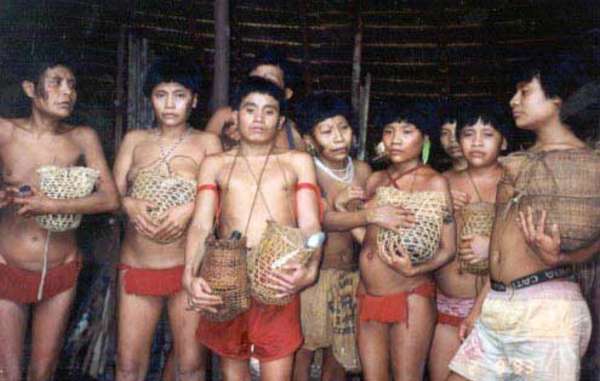By Margaret Janelle R. Hutchinson
Impunity Watch Reporter, South America
CARACAS, Venezuela – Dozens of members of the Yanomami indigenous group were reportedly massacred back in July, according to a document released on Wednesday by various indigenous rights organizations. Reports of the incident are only now reaching Venezuelan authorities due to the remoteness of the indigenous villages. The killing may be the latest tragedy in a pattern of vicious encounters between Yanomami and Brazilian gold miners.

Residents of the Hokomawe village said they discovered charred bodies and the torched “shabono” or communal house during a visit to the indigenous community of Irotatheri in early July. Of the approximately eighty residents of Irotatheri, only three survivors were discovered hiding in the forest.
The survivors reported that they had been out hunting at the time of the attack, which they blamed on miners from nearby Brazil. The hunters said they heard gunshots, explosions and the sound of a helicopter, which miners sometimes use to ferry supplies.
According to the survivors’ account, the miners attacked because some in the community had been “rescuing Yanomami women” from miners.
The Yanomami have often had to contend with Brazilian gold miners, known in Portuguese as garimpeiros, who for years have crossed into Venezuela and torn up the forest, leaving pits of water laced with mercury.
In 1993, activists say, 16 people were killed by Brazilian miners in a Yanomami community in the area of Haximu. In 2010, Venezuelan authorities said four people in an indigenous community died after drinking water contaminated by miners.
The Yanomami are one of the largest isolated indigenous groups in the Amazon, with a population estimated at roughly 30,000 on both sides of the Venezuela-Brazil border. They have maintained their language as well as traditions that include face paint and wooden facial ornaments piercing their noses, cheeks and lips.
The isolation of the Yanomami caused the delay in reporting. The account of villagers from Hokomawe who saw the victims’ remains and talked with the three survivors was later relayed to others in the village of Momoi after days of walking through the forest. Others then took the news to the larger community of Parima.
The site where the attack is alleged to have happened, in the Venezuelan municipality of Alto Orinoco, near the Brazilian border, is a five-hour helicopter ride, or 15 days on foot, from Puerto Ayacucho, the main Venezuelan city in the Amazon.
Prosecutors were appointed to investigate after leaders of the Yanomami organisation Horonami alerted them to the account, Venezuela’s Public Ministry said in a statement Wednesday.
As of Friday, no headway had been made in the investigation.
Brazil’s Foreign Ministry said on Friday its embassy in Caracas had asked the Venezuelan government to provide it with any information that could help it determine whether the attack had happened and whether Brazilians had been involved.
Brazil’s National Indian Foundation, a government body that oversees indigenous affairs, said it would seek a joint investigation by officials from both countries at the site.
Venezuelan Interior Minister Tareck Al Aissami said in televised comments on Friday that officials had managed to speak with seven of the nine known groups of the Yanomami tribe and thus far had no proof of an attack in any of their settlements.
There has been an outcry from native rights groups across the globe.
Stephen Corry, Director of Survival International said, “This is another appalling tragedy for the Yanomami – heaping crime upon crime. All Amazonian governments must stop the rampant illegal mining, logging and settlement in indigenous territories. It inevitably leads to massacres of Indian men, women and children. The Venezuelan authorities must now bring the killers to swift justice, and send a signal throughout the region that Indians can no longer be killed with impunity. The mining and logging must be stopped.”
The Yanomami have complained of increasing encroachment by the miners.
“The presence of garimpeiros in this area has been documented since at least four years ago, and complaints have been made various times,” said Aime Tillett, an activist with the indigenous rights organization Wataniba in Caracas. “What we’re asking is for the government to take sufficient measures to control the garimpeiros.”
Though the exact death toll is unknown, Linda Manaka, a representative of the Venezuelan Association of Indigenous People in Puerto Ayacucho, said that based on the account she believes dozens died.
“Generally a ‘shabono’ is made up of dozens of people,” she said. “At least there are about four, five dozen people.”
For further information, please see:
The Guardian – Brazil asks Venezuela to investigate village massacre claims – 1 September 2012
Chicago Tribune – Brazil presses Venezuela on alleged Amazon massacre – 31 August 2012
CNN – Venezuela to investigate reports of massacre of Indians by gold miners – 30 August 2012
Fox News – Indigenous Amazon Reports Massacre in Venezuela – 30 August 2012
Survival International – Yanomami Indians ‘massacred’ by goldminers in Venezuela – 29 August 2012